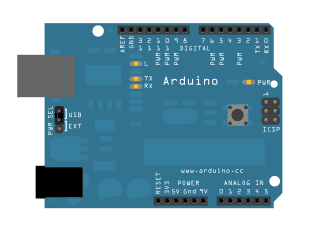String length()
You can get the length of Strings using the length() command. This example shows you how to use this command to reply to an input from the Arduino Software (IDE) serial monitor. If the input string is too long, the sketch will send a specific message to the user
Hardware Required
- Arduino Board
Circuit
There is no circuit for this example, though your board must be connected to your computer via USB and the serial monitor window of the Arduino Software (IDE) should be open.

image developed using Fritzing. For more circuit examples, see the Fritzing project page
Code
length() returns the length of a String. There are many occasions when you need this. For example,if you wanted to make sure a String was less than 140 characters, to fit it in a text message, you could do this:
/*
String length()
Examples of how to use length() in a String.
Open the Serial Monitor and start sending characters to see the results.
created 1 Aug 2010
by Tom Igoe
This example code is in the public domain.
http://www.arduino.cc/en/Tutorial/StringLengthTrim
*/
String txtMsg = ""; // a string for incoming text
unsigned int lastStringLength = txtMsg.length(); // previous length of the String
void setup() {
// Open serial communications and wait for port to open:
Serial.begin(9600);
while (!Serial) {
; // wait for serial port to connect. Needed for native USB port only
}
// send an intro:
Serial.println("\n\nString length():");
Serial.println();
}
void loop() {
// add any incoming characters to the String:
while (Serial.available() > 0) {
char inChar = Serial.read();
txtMsg += inChar;
}
// print the message and a notice if it's changed:
if (txtMsg.length() != lastStringLength) {
Serial.println(txtMsg);
Serial.println(txtMsg.length());
// if the String's longer than 140 characters, complain:
if (txtMsg.length() < 140) {
Serial.println("That's a perfectly acceptable text message");
} else {
Serial.println("That's too long for a text message.");
}
// note the length for next time through the loop:
lastStringLength = txtMsg.length();
}
}See Also
String object - Your Reference for String objects
CharacterAnalysis - We use the operators that allow us to recognise the type of character we are dealing with.
StringAdditionOperator - Add strings together in a variety of ways.
StringAppendOperator - Use the += operator and the concat() method to append things to Strings
StringCaseChanges - Change the case of a string.
StringCharacters - Get/set the value of a specific character in a string.
StringComparisonOperators - Get/set the value of a specific character in a string.
StringConstructors - Initialize string objects.
StringIndexOf - Look for the first/last instance of a character in a string.
StringLengthTrim - Get and trim the length of a string.
StringReplace - Replace individual characters in a string.
StringStartsWithEndsWith - Check which characters/substrings a given string starts or ends with.
StringSubstring - Look for "phrases" within a given string.
StringToInt - Allows you to convert a String to an integer number.
Last revision 2015/08/27 by SM